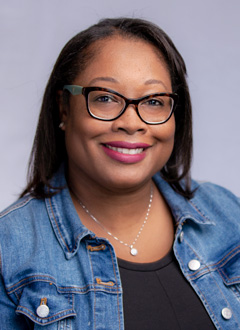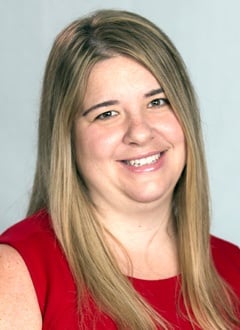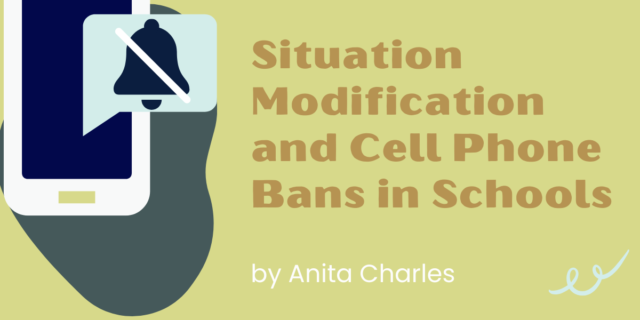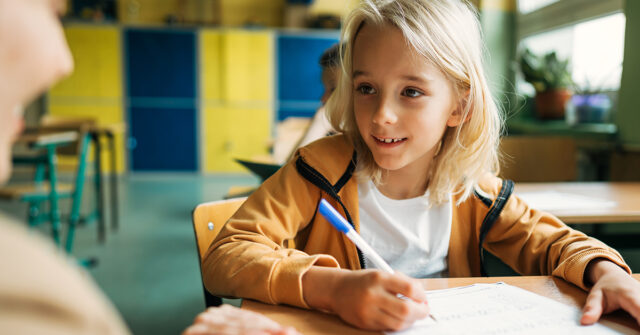
How many times during a writing workshop have you thought, “If only I could clone myself!” Well, authors Dana Johansen and Sonja Cherry-Paul have a solution for more one-on-one teaching time during your writing workshop: flipped learning. In their new book, Flip Your Writing Workshop, they explain how a blended learning approach allows students access to instruction and support when they need it, as often as they need it.
Now, they’re not talking about replacing you, the teacher, rather flipped learning lets students access a variety of mini-lessons on their own, work at their own pace, or move ahead and review concepts, depending on a student’s needs. Dana and Sonja say this gives the teacher more time to maximize individual instruction and conferring. We started our conversation on their first book, Teaching Interpretation, and we asked them how the two books relate?
Below is a transcript of this episode.
Dana: Sonja and I are so lucky and thankful to be able to work together. We're both classroom teachers. I teach 5th Grade and Sonja teaches 6th. We actually work in different schools and we live about an hour from each other. I live in Connecticut, Sonja lives in New York and we meet on the weekends at a Panera Bread and we get together and we talk about what's going on in our language arts classrooms.
Our first book as all about teaching reading, teaching interpretation using digital texts and teaching close reading skills. A thread in the first book was how to use a balanced blended learning approach in our classroom. It just made sense for us that our second book would be about using technology and writing workshop, and how to use a balanced blended learning approach in the writing workshop as well.
Brett: Sometimes Flip Learning is assumed to be just for science and math classes but that's not so. Can you guys explain more about that?
Sonja: I think that a lot of teachers associate Flip Learning with math and science and particularly with high school students and maybe college students. Dana and I read a lot of literature that certainly supported that, but we wanted to think about how could this look in a reading workshop, in a writing workshop and with students who are younger, students Grades 3 through 8.
We played around with this for a couple of years just thinking this through and trying it out in our classrooms. We discovered that there were a lot of benefits. Engagement was increased in our classrooms. We were able to differentiate instruction. Students could access what they needed and move more independently through curriculum. We want people to know that Flip Learning is not just about math and science, and it's not just about high school students, that your students can do this in writing workshop and there are a lots of benefits to this work.
Dana: We've also connected with a lot of teachers on Twitter which we love. Yay!! Join us on Twitter. It's been a real joy and a real privilege to connect with people across the country in elementary school and middle school and high school and college who are doing this work in the humanities.
Sonja: And are passionate about it.
Dana: Are really passionate about it, we've learned a lot and it's been really exciting.
Brett: Why has Flip Learning become such an important part of your literacy classroom?
Dana: I think Flip Learning has become such an important part of our literacy classroom. For one, huge reason, and we learned it from a participant actually in one of our recent workshops. She came to us and she said, "I get it. I get the Flip Learning thing." She said, "Flip Learning is like hitting play on a great anchor chart." That is what it's like in the language arts classroom.
Flip Learning helps you personalize your instruction with your students because in the writing workshop everyone's in a different place and it's about differentiation.
Sonja: I think another thing that people are a little bit confused about is the idea that somehow we're flipping these lessons and then that's it. You flip it and you forget it. Somehow the teacher is doing less work. We just very much want people to know that Flip Learning isn't about teachers somehow doing less work, it's about students being able to do more. You are still present in that classroom. Your students need you. Now there is more of you to give in a sense because of Flip Learning.
Dana: Right. Sonja and I like to talk a lot about now we can sort of clone ourselves in a way. We can be in multiple places at once during the workshop. We all know as workshop teachers that kids are all in different places working at their own pace and this way we can be in multiple places at one time.
Sonja: If you're running a true workshop it is productive chaos. That's what's happening. There's many balls in the air at the same time. Students are not in lock step with one another in a true workshop. Flip Learning really is a way to help students access instructions and teachers manage that wonderfully chaotic environment that we love in our workshops.
Brett: Sonja, tell me what inspired your first flip?
Sonja: I would say frustration. If we are going to continue thinking about that wonderfully chaotic workshop environment, whether it's writing workshop or reading workshop, there's a lot of frustrations on the part of teachers and on the part of students. I would say that would be my inspiration. How can I problem solve some of the issues going on in my classroom?
One of the major issues in my classroom was students needing to leave the room for various services, whether it's English language learning services or speech or needing to speak with a school counselor, or needing to go band and orchestra lessons. Our classrooms can sometimes be a little bit of a revolving door. For many of my students they were not necessarily skipping out of the room, like, "Yay, I'm missing writing workshop!" They desperately want to not miss the instruction and to keep up with what's going on in the classroom. Flipping lessons is a way for me to help all students get the instruction that they need. That would be one of the reasons why.
Brett: Tell me how should an educator decide what lesson to flip?
Dana: I think the most important thing for an educator deciding which lessons to flip is to consider which lessons do you find yourself reteaching throughout the school year. I know that one of mine, and I tell Sonja this all the time, is that dialog lessons, that punctuation lesson with the quotation marks. That's something that my students need to review throughout the year. I think you just want to sit down and you want to say to yourself, "Okay, what are the 3 things that I find myself constantly reteaching?"
Then you want to ask yourself, "What are the lessons that I know that some students are going to need to review throughout the year and look back on, and what are some lessons that can really push some students forward, but I might not get to in the classroom." I would sit down and make a list of 3, I would start with 3 and move from there.
Brett: What if an educator has maybe some limited technology in their classroom, or they're not comfortable with technology? What would your advice be for them?
Sonja: I think that recently we're hearing a lot about one-to-one environments in many schools across the country which is really fantastic. However, access to technology and comfort using technology are very real issues for many, many teachers. Dana and I run across teachers who experience frustrations with this on a daily basis, and we have experienced frustrations with this.
We thought a lot about that when we wrote our book. We wanted teachers to feel that they could do this work. We know that they want to but we wanted to make sure they felt like they could do it. We tried to problem solve lots of different situations that might arise with technology.
Dana: Right, we tried making flip lessons with a cell phone. We tried making flip lessons with an iPad. We tried making flip lessons from Chromebooks, from laptops. We've tried every device we could get our hands on in order to see, okay well if a teacher has this piece of technology, then how can he or she make the lesson. Is it possible and how would that work?
Sonja: Where would these lessons go? If every child doesn't have access to a computer how would this look in a classroom in a workshop environment? Thinking about the one computer in your room and whether or not you are able to upload to a class blog, or if you are a Google classroom teacher, or if you need to use a flash drive.
Dana: Right, many flash drives.
Sonja: We tried to really think about all of these different scenarios and give strategies for teachers who want to do this work.
Brett: Now talk a little bit about the importance of students setting goals in the writing workshop.
Dana: I think that's one of the most important aspects of the writing workshop. What I love about Flip Learning in the writing workshop is that when you create your Flip lessons you have in mind already how you're going to help the student reflect on, okay, what is this lesson about and what do I need to take away at the end of it and do I have questions? One of the most important things that my students always talk to me about in terms of Flip Learning is that what do they do when they have questions, when they are accessing a Flip Lesson how do they do this reflection piece?
This is something that we practice together as a whole group. This is something where we use lots of different methods for writing down our reflections, whether it be in trends or exit tickets, to assess or to write down our goals for the next day. If we're jotting in our notebook what our goals will be the next day. If we're jotting on a Post-it what we're doing in order to reflect.
Sonja: I use writing plans a lot in my classrooms. Students will come in and grab a graphic organizer and answer a few basic questions to outline their plan for the day and to determine whether or not they think they're going to access a Flip Lesson and if so, why. I have a rule in my classroom that my students are only accessing one Flip Lesson during writing workshop because all roads need to lead to writing because you'll have that clever student whose plan is like, "I'm going to watch 6 Flip Lessons today and then we'll see about what I'm going to do tomorrow."
Dana: They are entertainment.
Sonja: Dana and I are really careful about our students understanding you're not watching Flip Lessons, you are accessing instruction. What is your plan? It's very important.
…
 Sonja Cherry-Paul, Ed.D., has taught middle school English for twenty years. She is a literacy consultant who served on the Jane Addams Children’s Book Award committee for ten years. Sonja leads presentations about literacy at national conferences and provides professional development for educators on reading and writing instruction and racial literacy.
Sonja Cherry-Paul, Ed.D., has taught middle school English for twenty years. She is a literacy consultant who served on the Jane Addams Children’s Book Award committee for ten years. Sonja leads presentations about literacy at national conferences and provides professional development for educators on reading and writing instruction and racial literacy.
She is the coauthor, with Dana Johansen, of the titles Teaching Interpretation and Flip Your Writing Workshop.
Follow Sonja on Twitter @SonjaCherryPaul or visit her web site at sonjacherrypaul.com
 Dana Johansen has taught elementary and middle school for more than fifteen years. Dedicated to the ever-expanding applications of technology in the classroom, she presents at national conferences on the use of blogs, digital texts, and flipped learning in literacy instruction.
Dana Johansen has taught elementary and middle school for more than fifteen years. Dedicated to the ever-expanding applications of technology in the classroom, she presents at national conferences on the use of blogs, digital texts, and flipped learning in literacy instruction.
She is the coauthor, with Sonja Cherry-Paul, of the titles Teaching Interpretation and Flip Your Writing Workshop.
Follow Dana on Twitter @LitLearnAct


